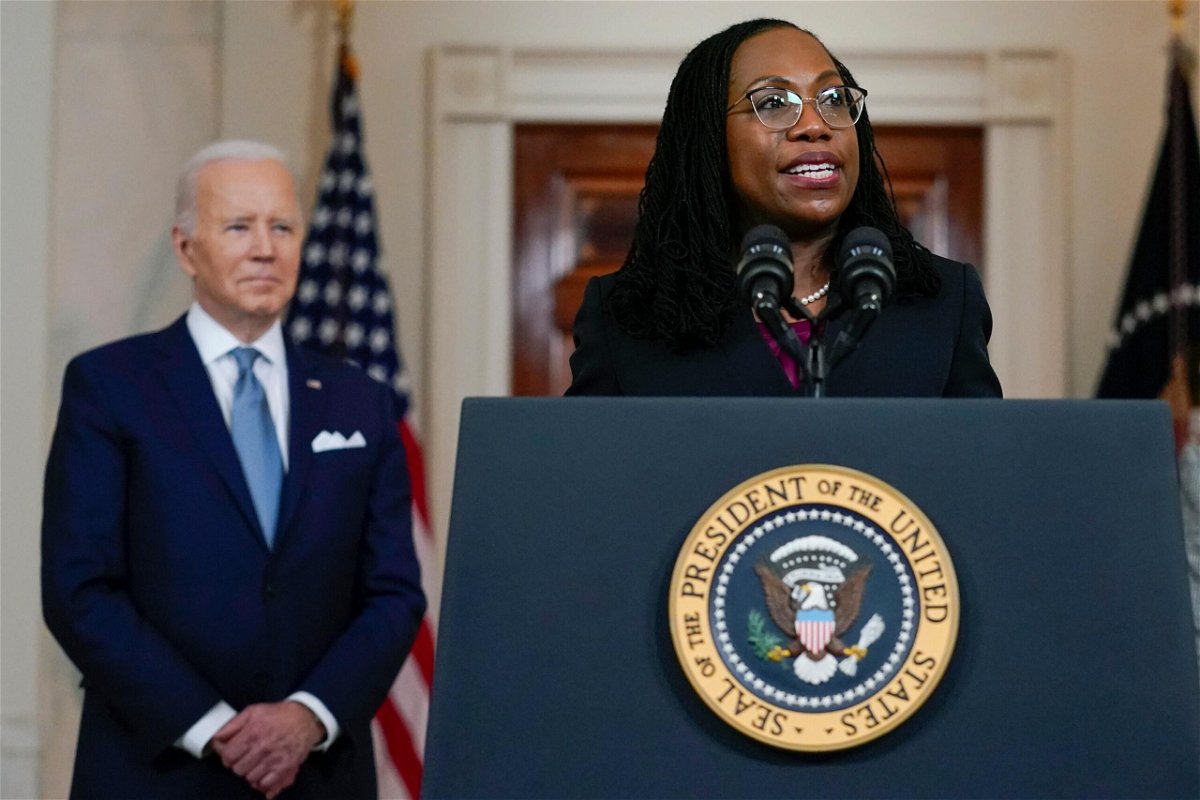New Senate questionnaire details Judge Ketanji Brown Jackson’s White House contacts during nomination process

Judge Ketanji Brown Jackson speaks after President Joe Biden announced Jackson as his nominee to the Supreme Court in the Cross Hall of the White House
By Tierney Sneed
The Senate Judiciary Committee posted on Tuesday Judge Ketanji Brown Jackson’s Senate questionnaire for her Supreme Court nomination, as lawmakers’ scrutiny of her record takes center stage in her confirmation push.
The questionnaire revealed new details about the judge’s contact with the White House in the weeks leading up to her nomination announcement, and it shed light on how she’d approach recusals if confirmed to the Supreme Court.
White House counsel Dana Remus reached out to Jackson on January 30 about the vacancy, according to the submission. In addition to the February 14 interview at the White House Jackson did with President Joe Biden, she also met with Remus that day, the questionnaire said, and she met with Vice President Kamala Harris via Zoom on February 11.
Jackson said she was also in contact with “White House Chief of Staff Ronald Klain and officials from the White House Counsel’s Office and the White House Office of Presidential Personnel regarding my potential nomination and the nominations process.”
She was offered the job on February 24, with the White House making the pick public the next day.
She said no one involved with the nomination process discussed with her her positions on specific cases or legal issues that could be before the Supreme Court, and that she made no representations as to how she’d rule on certain issues as a justice.
The 149-page filing was similar to the questionnaire she submitted last year for her nomination to the US Circuit Court of Appeals for the DC Circuit. The disclosures cover judicial nominees’ professional backgrounds, cases they worked on and other key points of their resumes.
In the eight months she’s served on the appeals court, Jackson has authored only two published decisions, according to the questionnaire.
She said that, of the 578 opinions she wrote as a district court judge, 10 of her decisions were reversed in whole or in part by the DC Circuit, four decisions were vacated by the appellate court and remanded, and in three other of district court decisions, her judgment was affirmed but the DC Circuit criticized the substantive rulings.
One section of the questionnaire covers recusals. Jackson noted the recusal list she assembled as a lower court judge, which is used by court case assignment software to funnel cases away from judges who have potential conflicts.
“If confirmed to the Supreme Court, I will continue my present practice of using a recusal list to identify and avoid potential conflicts,” Jackson said on the new questionnaire. Justice Amy Coney Barrett made a similar commitment on her questionnaire in 2020, though it hasn’t been the norm for previous Supreme Court nominees.
The recusal procedures for the Supreme Court are more opaque than for lower court judges.
The questionnaire also asks nominees to elaborate on the 10 most significant cases they were involved in as a judge. As she had as a nominee to the DC Circuit, Jackson noted her 2019 ruling siding with the House in its efforts to obtain testimony from then White House counsel Don McGahn as well as her 2018 ruling mostly in favor of union organizations challenging executive orders issued by then President Donald Trump.
Her latest questionnaire adds to the list of significant cases a DC Circuit opinion she wrote siding with public sector unions in their challenge to a 2020 Federal Labor Relations Authority policy that heightened the threshold for requiring collective bargaining. She also added to the list a 2013 case where, as a district court judge she rejected a meat industry request to halt a Department of Agriculture regulation.
The-CNN-Wire
™ & © 2022 Cable News Network, Inc., a WarnerMedia Company. All rights reserved.
CNN’s Lauren Fox contributed to this report.